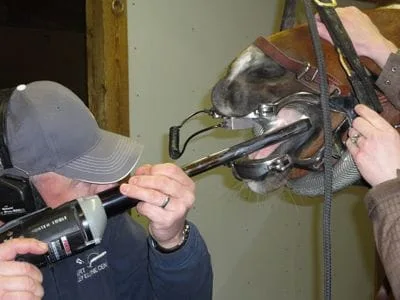The equine tooth is much different than the human tooth in that it continues to erupt throughout the life of the horse. As the teeth wear, sharp points form and can cause uncomfortable ulcers in the mouth. Because of this, annual dental examinations are needed to locate and correct problems before they start. Dental examinations should be performed starting at 6 months of age, every 6 months for growing horses, yearly for the mature house, and every 6 months for the geriatric horse.
We correct dental problems by floating (filing down) the sharp points of the tooth. If you notice your horse chewing abnormally, losing weight, dropping food, head shaking or resisting the bit, these may be signs that your horse needs a float. If dental problems are severe, your horse may require more frequent floating. Our dentistry equipment consists of motorized dental equipment, hand floats, oral speculum and a head rest to allow good visualization of the oral cavity. Our dental services include dental examination, floating and tooth extraction. Because of the sensitive nature of the mouth, all dental services are performed under sedation.
Benefits of using a Licensed Veterinarian for your horse’s dentistry.
- Horse owners today have many options when choosing someone to perform dentistry on their equine companions. Here are some points to consider when making this important decision:
- A licensed veterinarian is the only person that can legally sedate your horse and they carry insurance in the unlikely event that “something goes wrong” during the dental procedure.
- In the case of an emergency a licensed veterinarian has the medical training and medication to immediately treat your horse.
- A licensed veterinarian has a thorough medical background and training to diagnose and treat problems of the mouth, gums, tongue and teeth. Dr. Phillips has practiced veterinary medicine for 38 years and one of his specialties is dental care. Lay dentistry schools range from 3-5 weeks.
- Veterinarians are licensed and regulated. Lay dentists are not.
- Older horses need to be handled with care during the dental procedure. They tend to have more sensitive teeth and are more sensitive to sedation. A licensed veterinarian knows the combination of sedation to keep the older more fragile horse comfortable and pain free.
- A licensed veterinarian understands the negative consequences of “over floating”.
A horses tooth is not meant to be smooth. A horse is an herbivore and his teeth are specifically designed with ridges and roughness to them to provide a grinding surface for grinding forage. If a horses tooth is ground too far down (“over floating”) to a point where his teeth are smooth he no longer has a good grinding surface available. When this happens he is more susceptible to choke and colic. Both of these conditions can be life threatening. In addition, a horse is born with only a certain amount of tooth and once it is gone, it is gone. Also, if a horses tooth is ground down to the point where the sensitive pulp is exposed this can lead to abscessing and tooth loss.
NOTE: All dentals are in clinic only.

